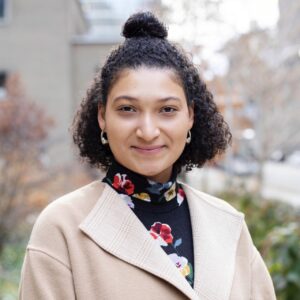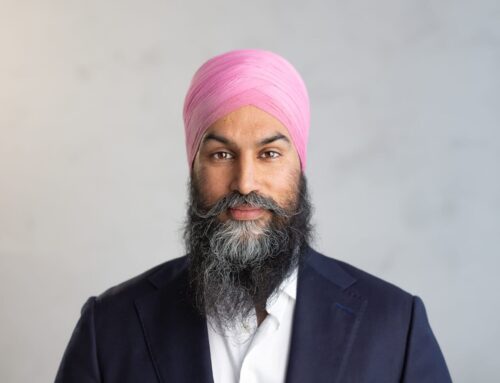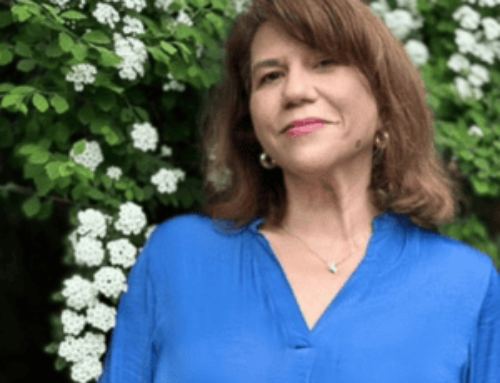 We’re in climate crisis – and marginalized women, girls, and gender-diverse people bear the brunt. Young climate justice leaders are ringing the alarm. It’s about time we listen.
We’re in climate crisis – and marginalized women, girls, and gender-diverse people bear the brunt. Young climate justice leaders are ringing the alarm. It’s about time we listen.
In a sense, climate change and global warming hurts everyone. But we’re not all equally impacted. Some people have more resources to deal with fallout. Some of us are more or less protected from consequences of growing carbon dioxide and greenhouse gas, emissions and the burning of fossil fuel, sea-level rise, methane, and more. It’s a matter of power.
The solution lies not only in mitigation and renewable energy. We need climate justice.
This is where gender justice comes in: the most vulnerable women, girls, and Two Spirit, trans and non-binary people experience the worst outcomes in climate crisis. And their leadership in climate solutions is more important than ever.
Young feminists are strong voices for the intertwined goal of climate justice and gender justice. We can’t have one without the other. Our guest Sydney Piggott (she/her) is a social impact leader and advocate for gender equity, climate action, and social justice on a global scale. She’s been a subject matter expert in several international forums including the Commission on the Status of Women, Women Deliver, Inter-Parliamentary Union Conference for Young Parliamentarians, and RightsCon. Passionate about supporting young changemakers, Sydney has worked with several youth initiatives focused on gender and climate justice including the Ontario Council for International Cooperation’s Youth Policy-Maker’s Hub, Apathy is Boring’s RISE program, Community Knowledge Exchange’s Cohort X, and the Online Thinkathon Challenge in partnership with the European Union. She is also a contributor at Btchcoin News and a member of the Equal Futures Network Advisory Committee. Sydney brings an intersectional feminist lens to all of her work, informed by her proud Afro-Caribbean heritage.
Transcript
00:00:00 Andrea
We’re in climate crisis and marginalized women, girls and gender diverse people bear the brunt. Young leaders in climate justice have been ringing the alarm, and it’s about time we listen.
00:00:14 Andrea
My name is Andrea Gunraj at the Canadian Women’s Foundation.
Welcome to Alright, Now What?, a podcast from the Canadian Women’s Foundation. We put an intersectional feminist lens on stories that make you wonder “Why is this still happening?” We explore systemic roots and strategies for change that will move us closer to the goal of gender justice.
The work of the Canadian Women’s Foundation and our partners takes place on traditional First Nations, Métis, and Inuit territories. We are grateful for the opportunity to meet and work on this land. However, we recognize that land acknowledgements are not enough. We need to pursue truth, reconciliation, decolonization, and allyship in an ongoing effort to make right with all our relations.
00:00:56 Andrea
I think of climate crisis the way I think of a global pandemic. In a sense, we’re in it together. We can’t deny the way we’re all affected. In a sense, the crisis doesn’t discriminate. But in another sense, there’s no way we can say we’re in it equally. Some of us have more resources to deal with the fallout. Some of us are more or less protected from consequences. We’re not equally impacted. It’s a matter of power.
No wonder people say the solution to climate disaster is nothing less than climate justice. Those with less power, less access, less resources feel the impact of climate crisis more.
This is where issues of gender justice again become pressing. The most vulnerable women, girls and Two Spirit, trans and non-binary people experience the worst outcomes in climate crisis and at the same time, their leadership in the solutions is more important than ever.
I’m heartened by the feminist thought leadership of young women and gender diverse people. They’ve been strong voices for the intertwined goal of climate and gender justice. We really can’t have one without the other.
I had the chance to talk to Sydney Piggott, a social impact leader and advocate for gender equity, climate action and social justice on a global scale. She’s worked with several youth initiatives on gender and climate justice, including Community Knowledge Exchange’s Cohort X. Sydney brings an intersectional feminist lens to all her work informed by her proud Afro-Caribbean heritage.
00:02:32 Sydney
I do a lot of things in my day job. I work at social impact, which is awesome because I can bring my heart work to my paid work. But what I’m really talking about is the intersection of gender equity, social justice and climate action.
I spend a lot of time supporting youth buds, movement, community initiatives that use an intersectional approach to tackling climate, race, gender, all of these different things that are very interrelated despite how we’ve been thinking about them for a really long time.
Specifically, when it comes to gender and the climate. I focus mostly on community-based solutions to food security. So, I really look at how community members are the best decision makers when it comes to food justice. It turns out the people who are experiencing the worst of the climate crisis are actually the experts when it comes to making really innovative, interesting and inclusive solutions. I work on that from a research perspective, also from supporting community organizations, and I advocate for more community based and intersectional approaches to food equity. I do that both here, but also I’ve done work in East Africa and the Caribbean, which is really exciting and that work is really national on international projects, which is exciting.
I’m also part of Cohort X. Cohort X is actually an initiative of Community Knowledge Exchange and a Canadian Women’s Foundation grantee. I get to learn from an incredible community of people who are doing work at the intersection of gender and climate justice across the countries. It’s not just me who is part of the accountability and nominations council with two awesome folks who are also doing amazing work in climate action and gender, but I’m also working with the Wise Council, the team at Community Knowledge Exchange and most importantly the members of the cohort. This is actually the second year that the cohort has existed and the second year that I’ve been a part of it. So, I get to learn from incredible climate activists and gender justice activists across the country.
00:04:37 Andrea
We hear a lot of things about gender issues and climate issues, usually individually.
Tell us why we need to put them together.
00:04:46 Sydney
It’s so great to see that gender and climate justice have been linked more recently, with sustainability and climate change being the theme of the United Nations Commission on the Status of Women this year. That was a huge win for the gender and climate movement.
It’s clear that there’s a global push to consider the two together. And the fact that they are linked. Actually, UN Women published earlier this year, ahead of International Women’s Day, an explainer that talked about how gender inequality and climate change are interconnected. This week is Africa Climate Change Week. They’ve been re-posting a lot of these types of explainers to help people understand the connection between gender and climate change.
There’s three things that they really highlighted that has been central to my work and my understanding of climate action and gender equity.
The first one, one that I talk about a lot, which is that women, including youth and gender diverse people are historically and continue to be the people who are responsible for food and water in a lot of communities. This is present all over the world and has been for generations, and that means that the impacts of the climate crisis on things like clean water, sustainable food and water resources, health and healthy food, it disproportionately impacts women and girls globally. And that’s why I became interested in how we can create opportunities for women and youth and gender diverse folks to be decision makers when it comes to sharing these food resources, understanding the traditions of food, and how we can make sure to distribute food sustainably and equitably. And we see a lot more effective and sustainable food security processes when women and girls are at the center of these decision-making processes.
And another thing that the explainer talked about was how climate change impacts safety and health for women and girls. It’s kind of a natural way of thinking – if women and girls are already marginalized in many situations, when resources become even more limited, or when changing climate patterns affect how and when we access different resources, of course that’s going to impact women and girls more so than other folks. This can be from climate that is causing different diseases to become more common. We saw that with the Zika virus, for example, affecting pregnant people, diseases that are transmitted by insects are something that becomes more common in the climate crisis, so obviously that will impact folks who are do give birth and then there’s also conflict. Conflict over resources is a way to potentially impact gender-based violence. As we know, conflict and gender-based violence are very connected, so it was interesting to see UN Women bring that together and talk about it on an international stage.
Finally, the most important point is really that the climate crisis is impacting women, girls, and gender diverse folks at the margins. If we don’t take an intersectional approach, we’re excluding black and Indigenous women, queer and trans folks, people with disabilities, people living in remote and rural areas, who are already experiencing so many inequities and with the climate crisis are only experiencing them more.
And I think that the biggest learning that I’ve had from this work is that if we don’t apply an intersectional and gender inclusive lens to climate action, we’re not only making things worse for people who are facing greater inequities, but we’re also excluding the experts who bring value to this movement. If women, girls, and gender diverse folks for generations have been experts in climate action before we even called it that, it’s really important that we center them in the solutions that we’re making today.
00:08:41 Andrea
We’re living in times of uncertainty and upheaval.
Now more than ever, we need to rally together to create the kind of world we want to live in and make no mistake, a gender equal Canada is exactly what we all need.
You’ll learn about how your tireless support is building gender justice in every province and territory, and you’ll hear real stories of real-life impact.
You’ll get a chance to ask your questions and share your thoughts on what needs to happen next. ASL, LSQ and French English language interpretation will be available. Save your digital spot today at canadianwomen.org.
00:09:27 Andrea
Why do you think youth leadership is so core to climate and gender justice today?
00:09:32 Sydney
Youth leaders have really come to the forefront when we talk about climate change and gender justice, specifically young women globally who has been the faces of this movement when 20 years ago that definitely wasn’t the case. And I think there’s an obvious reason for that. Youth will suffer the greatest consequences of the climate crisis, and we know that women, girls and gender diverse folks will be impacted even more.
That’s why it’s so important to allow youth to lead this movement. We hear a lot about Greta Thunberg and Fridays For Future, which is an incredible way to get involved in the climate movement.
But in Canada, we’ve also heard about Autumn Peltier, who’s an incredible initial they activist who’s a great example of a young leader who was advocating to protect water resources globally. I really think the cool part about Autumn’s story as well is that she brings in that intergenerational collaboration that we see a lot in the gender justice movement but don’t always see in climate action. And I think that’s where the movements can really learn from each other.
With the example of Autumn, she’s following in the footsteps of her great aunt Josephine Mandamin, who many people know as one of the Water Walkers who was bringing attention to this issue globally 10 years ago and now her teenage grandniece is continuing and passing on that torch. I think it’s really incredible to talk about that example as both youth leadership and intergenerational leadership.
Given that it’s Africa Climate Week, I wanted to also talk about an incredible young climate activist in Uganda, Vanessa Nakate. People may have heard of her before because she is getting a lot more attention now, but she’s a really strong example of how we can talk about climate, gender and race together. She’s actually started a really interesting initiative that I highly encourage people to check out 1Million Activist Stories. So she’s actually storytelling around these different issues and how they relate around the world with other young activists and sharing on platforms like Twitter, like Instagram, on websites to be able to talk a little bit more about what young people are doing globally. And I think what’s really important about that is that she’s giving a platform to young climate activists who may be doing something really impossible in their communities, but won’t get the same attention as some of the larger, better known young activists. There’s incredible stories and also really awesome initiatives to support.
And of course being part of Cohort X, I have to shout out that incredible community ckx.org and check out that incredible cohort and community of people, folks of all ages, who are doing this work, but a lot of incredible young people who are making a change here in Canada.
00:12:24 Andrea
So, what can a regular person like me do right now to start getting into this joint climate and gender justice effort?
How can I learn more and start taking some action?
00:12:33 Sydney
Just read about what folks are doing. Folks in that cohort share their work so openly with us, so graciously with us. It’s really important that we amplify it, whether it’s talking with your friends and family and community about something cool that you learned that they’re doing or donating to their cause, posting it to your Instagram story, or retweeting things. Those things are really helpful. They seem really small, but actually they do change the narrative around how we think about climate and gender as interrelated.
Also something we can do that a lot of people don’t think about is that we can choose with our wallet and I don’t necessarily mean things, like spending less are things like that, but actually supporting feminist causes and climate action with a feminist lens. That can be grassroots movements that are doing this work. It can also be women-owned businesses that are really thinking about sustainability in cool and interesting ways. I think about Cheekbone Beauty, which is a beauty company that’s an Indigenous woman led company. Not only are the makeups perfect for different skin tones, which is incredible and inclusive, but also an incredible sustainability lens using recycled materials and materials that can be reused, which is fantastic.
You can also look at doing your banking or investing with a climate and gender conscious lens, whether that’s with an institution that’s doing something great for the climate or with funds, that support women owned businesses, for example, or things that are climate positive, not just carbon neutral. There’s a lot of ways that you can do that. You just have to do a little bit more research.
Of course, there’s the exciting way in my perspective, which is to hold big emitters accountable when you can. This doesn’t necessarily have to always be marching in the streets, although you can do that with youth led actions like Fridays For Future, which is huge. But you can also join local actions, whether it’s with your elected officials in person or you can find a petition. Organizations like 350.org make it super easy to do something like this. Takes a lot of thought out of it, and it actually does make a huge impact when lots of people come together.
I think the biggest lesson of bringing climate and gender justice together is that collective action is so important. Even if your action seems really small, you’re actually part of a huge community that’s making a difference, and I think that can be really reassuring when it feels overwhelming.
00:15:06 Andrea
Sidney gave us some great tips on where to get started. Taking the time to listen to what young activists are telling us with our hearts and our minds is a necessary first step to transformation.
And if you want to learn more about Autumn Peltier, Chief Water Commissioner for the Aniishnabek Nation, watch The Water Walker, a beautiful documentary about her.
00:15:31 Andrea
I want to thank SheRules.biz for rating and commenting about us on Apple Podcasts. They say: “I love how this podcast reiterates so clearly, the issues that surround women constantly. Thank you for keeping the door open for conversations about gender equality.”
And I want to encourage you to share what you think about Alright, Now What?
Your opinions and ideas matter – and you’ll help us do better into the future.
00:15:57 Andrea
Please listen, subscribe, rate and review this podcast and share it with others. If you appreciate this content, if you want to get in on the efforts to build a gender equal Canada, please donate today at canadianwomen.org and consider becoming a monthly donor. And thank you for being tireless in your support for gender justice.






